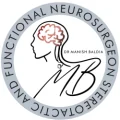The brain and spine form the central nervous system (CNS), which controls most functions of the body and mind. Dr Manish Baldia is Best Brain and Spine Surgeon in South Mumbai. When issues arise in these critical areas, they can lead to a wide range of symptoms that require various treatments, including surgery. Understanding the symptoms, treatment options, and potential surgical interventions is crucial for managing conditions affecting the brain and spine.
Common Symptoms of Brain and Spine Disorders
Symptoms associated with brain and spine disorders can vary widely depending on the specific condition and its severity. Common brain-related symptoms include:
- Headaches: Often severe and persistent, headaches can indicate conditions such as migraines, tumors, or infections.
- Seizures: Uncontrolled electrical activity in the brain can lead to convulsions, loss of consciousness, and other neurological disturbances.
- Cognitive Changes: Memory loss, difficulty concentrating, and personality changes may indicate conditions like dementia, tumors, or traumatic brain injury.
- Motor Impairments: Weakness, paralysis, or coordination issues can stem from stroke, tumors, or neurodegenerative diseases. Dr Manish Baldia is Best Brain and Spine Surgeon in South Mumbai
Spine-related symptoms often involve:
- Back and Neck Pain: Chronic pain in these areas may be due to herniated discs, spinal stenosis, or fractures.
- Numbness and Tingling: These sensations, especially in the extremities, can result from nerve compression or damage.
- Muscle Weakness: Difficulty in moving limbs or maintaining posture can indicate spinal cord or nerve root issues.
- Bladder and Bowel Dysfunction: Problems with these functions can arise from spinal cord injuries or degenerative diseases. Dr Manish Baldia is Best Brain and Spine Surgeon in South Mumbai
Diagnostic Approaches
Accurate diagnosis of brain and spine conditions is essential for effective treatment. Diagnostic methods include:
- Imaging Studies: MRI and CT scans provide detailed images of brain and spinal structures, helping identify tumors, fractures, and other abnormalities.
- Electroencephalography (EEG): This test measures electrical activity in the brain, useful for diagnosing epilepsy and other seizure disorders.
- Lumbar Puncture: Analyzing cerebrospinal fluid can help diagnose infections, bleeding, or multiple sclerosis.
- Neurological Examinations: Assessing reflexes, muscle strength, sensation, and coordination aids in identifying specific neurological deficits.
Non-Surgical Treatments
Many brain and spine conditions can be managed with non-surgical treatments:
- Medications: Anti-inflammatory drugs, pain relievers, anti-seizure medications, and muscle relaxants can alleviate symptoms.
- Physical Therapy: Exercise and physical therapy are crucial for strengthening muscles, improving mobility, and reducing pain.
- Lifestyle Changes: Weight management, regular exercise, and avoiding smoking can significantly impact spine health.
- Psychological Support: Counseling and therapy can help manage the emotional and cognitive effects of brain disorders. Dr Manish Baldia is Best Brain and Spine Surgeon in South Mumbai
Surgical Interventions
When non-surgical treatments are insufficient, surgical intervention may be necessary. Several types of surgeries address different brain and spine issues:
- Craniotomy: Involves removing a portion of the skull to access the brain for tumor removal, aneurysm clipping, or relieving pressure from swelling.
- Laminectomy: Removes part of the vertebra to relieve pressure on the spinal cord or nerves, often used for spinal stenosis.
- Discectomy: Surgical removal of herniated disc material that presses on a nerve root or the spinal cord.
- Spinal Fusion: Joins two or more vertebrae to stabilize the spine, often used in cases of severe degeneration or scoliosis.
- Deep Brain Stimulation (DBS): Involves implanting electrodes in the brain to manage movement disorders such as Parkinson’s disease.
Advances in Surgical Techniques
Modern advancements have significantly improved the safety and efficacy of brain and spine surgeries:
- Minimally Invasive Surgery: Techniques such as endoscopic surgery reduce recovery time, minimize scarring, and lower the risk of complications.
- Robotic Surgery: Enhances precision in spinal surgeries, leading to better outcomes and shorter recovery periods.
- Intraoperative Monitoring: Real-time monitoring of neurological functions during surgery helps prevent damage to critical areas.
Post-Surgical Care and Rehabilitation
Post-surgical care is crucial for successful recovery. It often involves:
- Pain Management: Effective pain control strategies, including medications and nerve blocks, are essential.
- Rehabilitation Programs: Tailored physical and occupational therapy programs help restore function and mobility.
- Regular Follow-Up: Monitoring for complications and assessing progress ensures timely intervention if issues arise.
- Support Systems: Family, friends, and support groups play a vital role in emotional and psychological recovery.
Conclusion
The brain and spine are integral to our overall health and well-being. Recognizing symptoms early, seeking accurate diagnoses, and understanding the range of treatments—from medications and therapy to advanced surgical techniques—can significantly impact patient outcomes. Advances in surgical interventions and post-operative care continue to improve the quality of life for individuals with brain and spine disorders. By staying informed and proactive, patients and healthcare providers can work together to achieve the best possible results in managing these complex conditions. Dr Manish Baldia is Best Brain and Spine Surgeon in South Mumbai.






